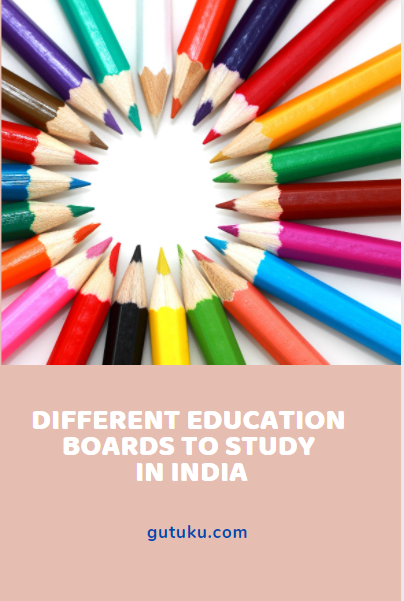There are different education boards in India. Before finalizing the school, it is important to understand the objective and functionalities of these boards. So that you can make informed decision about how the board is relevant to your child.
In this article we take you through 4 different education boards which are popular in India.

1. Central Board of Secondary Education (CBSE)
CBSE board is controlled by union government and it is the most popular education board in India. Objective of this board is to provide child centric, stress free education.
There are more than 20,000 schools affiliated to CBSE in India. It allows medium of instruction in Hindi and English. Parents with transferable jobs prefer this board because of its prevalence all over India.
CBSE conducts board exams for class 10th and class 12th students. After the implementation of NEP 2020 changes this will change. CBSE board scores are widely recognized and accepted (compared to other boards) by all the higher educational institutions in India.
Salient features of CBSE Board:
- Syllabus is compact with more focus on Math and Science subjects.
- Innovative teaching methodologies with emphasis on practical learning.
- Course content is designed as per NCERT standard. Some schools use standard NCERT textbooks whereas others use textbooks from private publishers.
- National level competitive exams are based on CBSE syllabus. Hence, CBSE students find it easier to crack and excel in these exams.
- Course materials are easily available. Digital books are available on DIKSHA site.
After the implementation of NEP2020 –
- Equal preference will be given for languages, literature and arts subjects.
- System will become more flexible by offering wide range of subjects and learning paths for students .
- They will add vocational courses at school level.
- Board exams pattern will change to test competencies, analytical thinking and core capacities.
2.Council for the Indian School Certificate Examinations(CISCE)
CISCE is National level non governmental education board. It conducts Indian Certificate of Secondary Education (Class 10th) and Indian School Certificate (Class 12th) examinations.
This board also conducts C.V.E (Certificate of Vocational Education) for Class 12th students. This certificate is to prepare the students for particular vocation. Only students who are enrolled in CISCE board can appear for these exams.
Salient Features of CISCE Board:
- ICSE gives equal importance to all subjects including language, literature and fine arts.
- It offers systematic study of language and grammar. Because of that students of this board have an edge over exams like TOEFL.
- Lot of importance given to practical learning. Hence 20% of the marks dedicated to lab work.
- ICSE syllabus offers wide range of subjects to choose from along with mandatory subjects. This helps students to study subjects of their choice.
- Though it offers lot of flexibility, it could be overwhelming for some students because of detailed study of all the subjects.
- ICSE schools are expensive compared to CBSE.
3.International Baccalaureate (IB)
International Baccalaureate is a non profit organization from Geneva, Switzerland. It offers Primary Years Programme (ages 3-12), Middle Years Programme (ages 11-16), Diploma Programme (ages 16-19) and Career related programme (ages 16-19).
Main objective of IB board is to develop inquisitiveness, analytical thinking and creating principled global citizens. Main focus on research and humanities.
IB Board is much more expensive than CBSE and ICSE board.
Salient Features of IB Education Board:
- International curriculum which offers superior programs.
- Research oriented rigorous study methods.
- It gives lot of flexibility for students to explore through projects and research work.
- It adds value and gives an edge for students pursuing degree/postgrad from International universities.
- IB board is going to be heavy on pockets and also it is considered to be prestigious by some parents.
4. State Education Boards
Each state and union territory in India has its own education board, which sets the curriculum and conducts board exams. Syllabus and grading methodologies differs from state to state.
In these boards education is mostly imparted in local languages and also in English. Parents who are settled in one particular state and wants education of local relevance opt for state boards.
Salient Features of State Board:
- Syllabus topics focus on contents of local relevance and languages.
- This board education helps students to prepare for state level entrance tests.
- More economical compared to other National boards so accessible to parents of all walks of life.
- NEP 2020 implementation is expected to bring changes to the pedagogical and board exam structures.


